#silmarllion
Explore tagged Tumblr posts
Text

Fëanor, Nerdanel and their 7 sons for @feanorianweek !
#feanorianweek#my art#maedhros#feanor#nerdanel#maglor#celegorm#huan#caranthir#curufin#amrod#amras#silmarllion
190 notes
·
View notes
Text
is it just me or does every russingon reunion fic ever go like this:
manwe: you’re kind of a dick, we won’t help you.
maedhros: I’m definitely a dick, I don’t deserve help.
Fingon, appearing out of nowhere and probably breaking some furniture: no! No! You are WRONG! Maedhros is my babygirl! You are killing him and you are killing me! Look, LOOK, YOU are the real dick, YOU!
#silm fandom#silmarllion#the silmarillion#silm#russingon#maedhros#maedhros x fingon#Fingon#maitimo#maitimo nelyofinwe#nelyo#nelyofinwe#russandol#Findekano
105 notes
·
View notes
Text

Break out the lava lamps, we’re getting groovy this month with a trip back in time to the funky 70s!
For this month's challenge, select a prompt or prompts from the '70s-themed lists below. You can use any aspect of the prompt that you want and we encourage creative interpretation of the prompts. Want to dig up a particular episode of a show from the TV list and use that? A favorite book cover for one of the titles on the literature list? A line from the theme song from one of the movies on the Movies list? Go wild, moon child! (Of course, tamer interpretations of the prompts are acceptable too!)
In order to receive a stamp for your fanwork, your response must be posted to the archive on or before 15 July 2024. For complete challenge guidelines, see the Challenges page on our website.
27 notes
·
View notes
Text
Taking his dog is not enough I need her to punch him in the face
Reblog if you think Lúthien should've committed violence against Celegorm.
Beren already got to commit violence against Curufin, so logically, Lúthien should've gotten dibs on committing violence against Celegorm
159 notes
·
View notes
Text
ROP Galadriel: I have been hunting Sauron for years, putting my kin in danger ,accidentally bringing back the devil and I will not stop until I revenge my brother's death!
Book Galadriel (and Celeborn): chilling at Doriath in the First age while her cousins and brothers dying in the worst way possible outside:
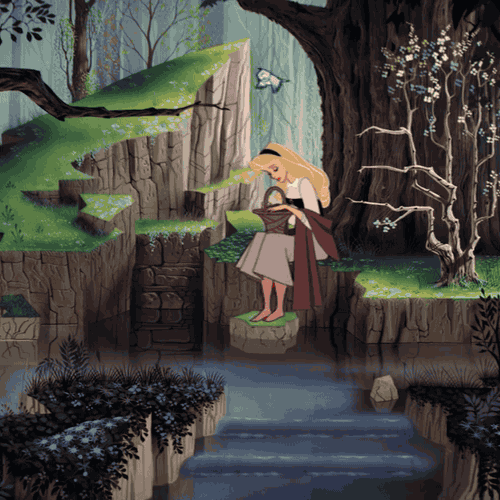
#minding her business that's why she lasts longest#amazon's oc can not be like her lol#galadriel#celeborn#lord of the rings#lotrs#the silmarllion#silm#the silm fandom#anti rop#anti rings of power#jrr tolkien#elves
19 notes
·
View notes
Text

I expect the outcome of these data will surprise no one. Women speak less, and women speak less. This isn't a typo: It means that they have fewer instances of dialogue in The Silmarillion by a substantial margin, and when they do speak, they speak nine fewer words than men, on average.
Instances of women speaking is much nearer to speakers of unknown gender than to men speaking. (And before we get excited and think that the "unknown gender" speakers are rejecting the gender binary, this category represents mostly dialogue attributed to a group, plus two unnamed individuals who are given dialogue and one sword.)
This matters because dialogue signifies several important things in The Silmarillion. First, in a pseudohistorical text like The Silmarillion, direct quotes mean that someone said something important enough to preserve in the historical record. Men, based on the data, are saying far more important things than women, at least in the various narrators' estimation. Next, dialogue is often a proxy to action: Characters debate, give directives, and make speeches. Dialogue also humanizes, and even though Tolkien rejects many modern literary techniques in The Silmarillion, he does use dialogue as a characterization technique. As I will show in future analyses, some characters are distinguishable based on how they speak.
Of course, the reduced dialogue of women in The Silmarllion is a direct effect of there being significantly fewer women than men: Women constitute only 19% of the named characters in The Silmarillion. Even given this, however, women speak less than we would expect.
When we look at character groups, there are notable differences, namely that women of the Ainur speak more than Mortal Human and Elven women do. (Only four Elven women and five Mortal Human women speak in The Silmarillion! Excuse me while I scream!) This was the thesis of the long-ago Inequality Prototype that spurred this data collection endeavor: The Valar, being prototypical, show an equal penchant for entering into the world based on gender: It is a 50/50 split. So we can't say that women have less desire to influence the world than men in the legendarium. When we see less action and fewer instances of dialogue among women, then, we have to ask why.
Complicating the data for the Ainur (overall, not just this set) is the fact that a big chunk of their dialogue occurs in the "Of Aulë and Yavanna" chapter that Christopher Tolkien wrote. I don't want to treat these data differently until I have the opportunity to collect more data on where dialogue outside this chapter comes from; for all I know, Christopher wrote most of it! (Actually, I know he didn't, but this chapter does illustrate how his additions can skew data for a particular group, in this case the Ainur.)
Another future area of inquiry will be the type or purpose of the dialogue and whether/how this varies based on gender. Characters speak for many reasons. Do women speak for different purposes than men?
If these data illustrate anything to me, it is the importance of fanworks in amplifying the voices of women characters who we know existed and know said and did things that mattered. We are being given a historical record much like our own Modern-earth historical record: biased toward the contributions of some over others. Only we can fix that.
---
This is part of my ongoing project The Silmarillion: Who Speaks? The data is available under a CC license for others who wish to play with it: View the data | Copy the data
127 notes
·
View notes
Text
I Read The Silmarillion So You Don't Have To, Part One
This is really for the benefit of my mother and sister, who are both diehard Lord of the Rings fans, but who don’t want to read The Silmarillion. My mother remembers picking it up with the expectation that it was another LotR book, and being disappointed that it read more like a history textbook than an actual novel. That’s because it’s not a novel, it’s a mythological epic along the same lines as the Homeric epics or the Epic of Gilgamesh, that tells the history of the first age of Tolkien’s world. It occurred to me that I am exactly the type of person Tolkien wrote The Silmarillion for — a person who knows folklore well enough to appreciate what he was trying to do, and recognize the conventions that he uses. I’m a person who went and applied to Yale’s graduate program in medieval studies (and got in!) just so that I could use the historical, cultural, and literary background of the Middle Ages to inform my own fiction. So, forgive me for saying it, but who’s better equipped to appreciate The Silmarillion than me? And it’s not as long as I thought, with only about 400 pages, which feels really doable after having read Jonathan Strange and Mr. Norrell. So, I’m going to paraphrase the whole of The Silmarillion, for all those who want all the juicy Tolkien lore but don’t want to read it themselves.
Before I get into it, here’s a bit of background, for those less versed in Tolkien lore: The Silmarillion is Tolkien’s magnum opus, which he spent his entire life working on and never properly finished. It could be called a “prequel” to The Lord of the Rings, but that would be misleading. It’s intended to be an original mythology for England, from before recorded history. The Hobbit and The Lord of the Rings are both small episodes from this enormous mythological cycle, and neither is really all that significant in the overall story of Tolkien’s world (which is probably why they actually got finished, and published). The Silmarillion and The Hobbit were originally meant to be completely separate projects, which is why they differ so much stylistically, but Tolkien eventually decided to combine them into the same world. The Lord of the Rings fully integrates the world of The Hobbit and that of The Silmarillion, with copious callbacks to both. (The reason Tolkien wrote it at all is because his publisher wanted a Hobbit sequel and not whatever weird thing The Silmarillion was.) The Silmarillion was not actually published until after Tolkien’s death (because he was never ready to officially declare it finished), and it was edited together by his son Christopher.
Christopher had to do a lot of reworking in order to make the narratives more fluid and consistent with everything Tolkien had written about the world. In that way, The Silmarllion kind of does resemble the ancient epics that it emulates — it’s cobbled together out of its existing material, with many pieces missing or compensated for. Christopher writes,
It became clear to me that to attempt to present, within the covers of a single book, the diversity of the materials — to show The Silmarillion as in truth a continuing and evolving creation extending over more than half a century — would in fact lead only to the confusion and the submerging of what is essential.
Like any mythology, The Silmarillion is fundamentally organic, so what Christopher did is the equivalent of taking a bunch of Ancient Greek primary sources and cobbling them together into something like Ovid’s Metamorphoses: A coherent narrative that arranges all the basic stories from the mythology in chronological order, making it much more comprehensible, but also stripping away all of its inconsistency and nuance. That actually makes it more authentic. The fact that one person was able to produce anything close to the complexity of an entire oral tradition is extraordinary.
I’m not going in blind. I have a general idea of what The Silmarillion is about, and I’m familiar with general Tolkien lore through osmosis (mostly thanks to Quora). I’m interested to see if my initial impressions hold up, how much of what I know about wider Tolkien lore actually comes from this book. I know the Fall of Numenor’s in it. Is Beren and Luthien’s whole romance in it, or is that only in the Unfinished Tales? What about Elendil and the formation of the half-elven line that would eventually end with Aragorn? What about Annatar? I guess I’ll find out.
Ainulindalë: The Music of the Ainur In which Melkor learns that it’s really disrespectful to deliberately sing the wrong thing during a choral concert.
In the beginning there was God, whom Tolkien calls Eru or Ilúvatar. Ilúvatar creates beings called the Ainur, which are sort of like gods and sort of like angels, and tells them to sing for him. Initially, each Ainu only comprehends the part of Ilúvatar that it represents, but eventually they start to understand each other, and gradually they start to understand Ilúvatar’s big vision of the universe. They start to harmonize, and their singing creates the world. I’m only a few paragraphs in, and it���s already so beautiful I could cry.
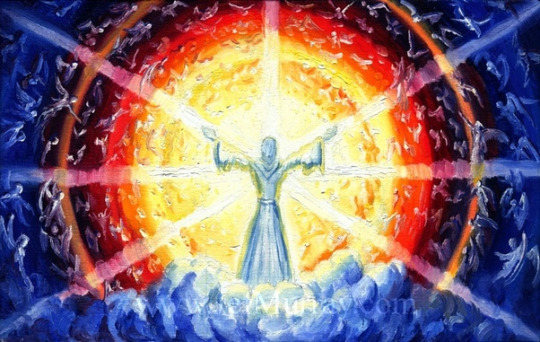
The Music of the Ainur by Jef Murray
The first thing I’m reminded of is the Platonic (and Kabbalistic) idea of emanation — God creates higher beings that are manifestations of his thoughts, and then the higher beings create the physical world, which is a manifestation of their thoughts. Magic in general follows this same pattern of manifesting one’s ideas in physical reality. There’s so much more I could say about that, but this is meant to be a summary and not a theological dissertation. I’m betting it’s not a coincidence, though.
The Ainur are made of Ilúvatar’s ideas, and all of them express Ilúvatar’s ideas through their singing. But — oh no! — one of the Ainur comes up with some ideas of his own, and decides to sing about his own ideas in order to glorify himself. If you hadn’t guessed already, Melkor is this universe’s Satan. Just like Lucifer, Melkor is one of the most powerful and glorious of the Ainur, and he’s a Special-Chosen-One-Magical-Girl because he has a little bit of each of the other Ainur’s powers (i.e. he shares in all of their divine domains). Melkor introduces some discordant notes into his singing, which introduces imperfection to the universe.

Ainulindalë by Paontaur
Most of the Ainur who are in Melkor’s choral section are like, “who the hell is singing off-key?” But some of them like his melody better than Ilúvatar’s, and start singing along with him. This makes matters worse. Ilúvatar simply smiles and starts conducting a new song that’s similar to the first one, but a little different, to accommodate the discordant notes. Melkor and his choir start singing louder in response, and the entire universe becomes the equivalent of a gorgeous violin concerto and a heavy metal riff playing at the same time, each at full volume. To get an idea of what this might sound like, I listened to “The Cloud Atlas Sextet” and the guitar solo from “Seven Nation Army” at the same time, and… it kinda worked, in a weird way, but it definitely sounded like the two songs were competing with each other. Not easy to endure for long, so, a good portion of the Ainur stop singing.
Ilúvatar lifts his other hand, and another song starts up, interweaving with the first. One is slow and sorrowful, the other is loud and abrasive, and together they drown out Melkor’s evil guitar riff. Raising both hands, Ilúvatar ends the music in a single chord that is deeper than the abyss and higher than the sky.
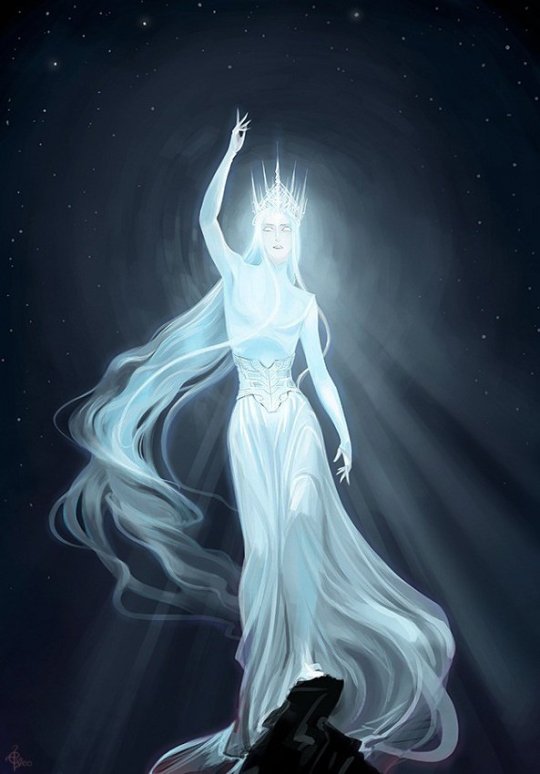
Eru Ilúvatar by Elveo
Ilúvatar addresses the Ainur, telling them that they will now see the things that were created with their music. To Melkor, he says, “If you try to change my music, you’ll find that you’ve actually made my music even better in ways that you can’t even conceive of. Everything you do is going to serve me anyway, so go ahead and try!” So, we get an answer to the Problem of Evil right off the bat. Discord is allowed to exist because, in a roundabout way, it improves the things around it. Every story needs a villain to be interesting, and Melkor is the villain of the story that Ilúvatar is telling.
Melkor feels ashamed, and then resentful. Ilúvatar gives the Ainur the ability to see (when before they were only able to hear), and shows them a vision of the world they made with their singing: Arda. Each recognizes the part of Arda that it personally sang into existence. They see some of the past, present, and future, and they also see things that they hadn’t conceived of. One of these things is a vision of the “Children of Ilúvatar,” the races of Elves and Men. Ilúvatar brought them into existence with the third song (the bombastic-sounding one), and the Ainur didn’t have any part in creating them. Most of the Ainur immediately love the people, and understand more of the mind of Ilúvatar through watching them.
Melkor and his followers, most of which are the most mighty of the Ainur, focus all their attention on Arda (as opposed to anything else in the universe). Melkor convinces himself that his goal is to help the Children of Ilúvatar in by putting the world in order, but yeah… sure, buddy. His real goal is to subdue all the Children of Ilúvatar to his own will instead of that of Ilúvatar.
The rest of the Ainur are very impressed by Arda, and especially by the sea, which contains the distant echo of the Music (which is why all the Children of Ilúvatar feel called by it). The Ainur that sang the water into being is called Ulmo (no, not Elmo), and of all the Ainur, Ilúvatar taught him the most about music. Each of the other Ainur was given a different concept to comprehend and sing into existence. The air and wind was created by Manwë, who is the noblest of the Ainu. The earth was created by Aulë, who’s almost as skilled as Melkor, but his sense of pride is in making beautiful things, instead of in himself.
Ilúvatar shows Ulmo that, although Melkor tried his best to destroy the idea of Water through his singing, all he did was make it even cooler in the manifest world. Melkor created Cold to freeze the water, but all that did was create beautiful snowflakes and whirls of frost, which Ulmo never even conceived of. Melkor created Heat to evaporate the water, but all that did was create the beautiful clouds and the music of rain falling. The clouds have the double benefit of bringing Ulmo closer to his friend Manwë (it probably says something about me that I read “thy friend, whom thou lovest” and immediately thought, SHIIIP!).
So, therefore, everything Melkor does to screw up Ilúvatar’s creation ends up improving it in the long run, and that’s why Ilúvatar allows Melkor to exist.
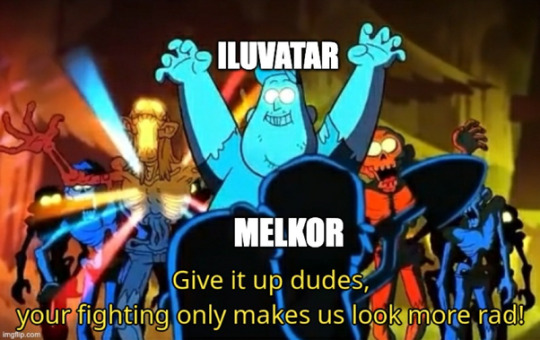
Arda does not actually exist yet, it only exists as an idea that has been described in the singing. So, Ilúvatar formally begins the manifestation of Arda with an epic Let There Be Light moment: “Eä! Let these things Be!” A light appears, and the light is the whole of the universe.
Many of the Ainur choose to remain with Ilúvatar, but a certain number of them descended into the manifest universe, Eä. Making this choice requires them to give up a significant amount of their power and ability for as long as Eä exists. That’s what being alive and in the manifest world does — it shoves you down into a smaller version of yourself and limits the things that you can do. (The Wizards experience this same thing, but on an even smaller scale.) The Ainur that decided to go to Eä are called the Valar, and they function mostly like gods and goddesses.
The Valar are disappointed to discover that the world doesn’t actually exist yet. The singing just conceived of it as an idea, and Ilúvatar kickstarted its manifestation, but now the Valar have to actually build it. So, they begin to painstakingly shape the primordial matter of Eä into Arda, the world as we know it. Manwë, Ulmo, and Aulë do most of the work, but Melkor is there too. Melkor is that guy who doesn’t actually help with the group project, but then takes credit for the whole thing once it’s done. While the other three are building the world, he offers unhelpful suggestions and changes things to make it suit his own vision. When Arda is young and covered in fire, Melkor figuratively plants a little flag on it and names it Melkor-land. Manwë, who was the lead singer of the second melody that Ilúvatar created in response to Melkor, is really pissed off and brings a host of other spirits down to Arda to kick Melkor out. No one gets to claim credit for a group project that everyone else worked on! Melkor goes off into a corner to sulk, and leaves Arda alone… for the time being.
The rest of the Valar give themselves physical forms. Because they’re all excited for the arrival of the Children of Ilúvatar, they base their appearances on the Elves and Men. Their humanlike forms, gender, and so forth are about as inconsequential to them as our clothing is to us, and they don’t always bother to “wear” their humanoid forms. Melkor sees them walking around on Arda in these beautiful forms that emulate the people and the elements of the world itself, and is even more resentful than ever. So, he gives himself his own physical form, and because he’s motivated by spite, his form is dark and scary instead of bright and beautiful. He appears as something like an ice-capped volcano, all fire and ice, striding through the sea.
What follows is the first war between the Valar and Melkor. The Elves don’t know very much about this, so, little of it is recorded. What we know is that Melkor went around and petulantly undid whatever the Valar were trying to do, like your annoying sibling who keeps knocking down your tower of blocks every time you finish building it. Whatever the Valar tried to make, Melkor would destroy. If the Valar made a valley, Melkor inverted it into a mountain range. If they carved out an ocean, Melkor “spilled” it. Everything in the world is therefore corrupted or somehow altered by Melkor, instead of matching the Valar’s original idea for it, but in the end the group project is finished and it comes close enough.
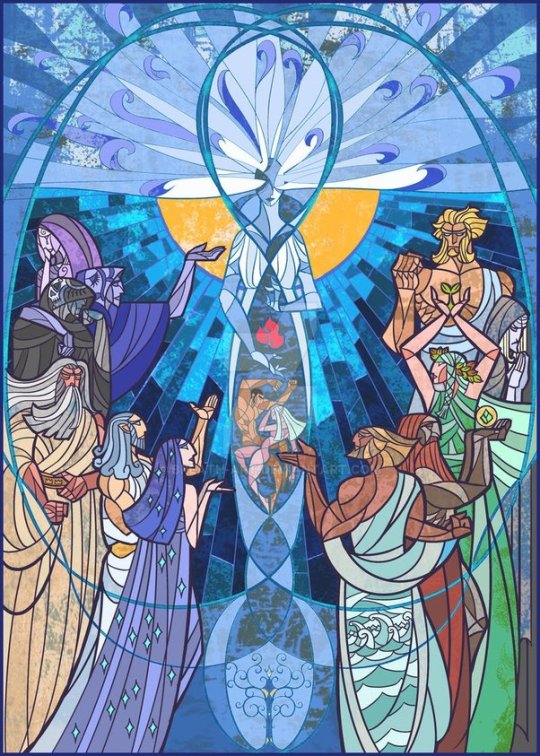
Music of Ainur by breath-art
Valaquenta: Account of the Valar and Maiar according to the lore of the Eldar In which we’re introduced to the T̶w̶e̶l̶v̶e̶ ̶O̶l̶y̶m̶p̶i̶a̶n̶s̶ Kings and Queens of the Valar, and the Maiar.
This is what every fantasy writer wishes they could do — just exposit on the lore of their gods! I wish I could explain all about my fictional gods and how cool they are at the start of my novels, but I’m not Tolkien. Maybe someday I’ll be famous enough that someone will buy a book like this one that consists of nothing but lore.
Now, imagine that you’re opening the D��Aulaires’ Book of Elven Myths, and reading about the great elven gods (or more specifically, the gods as the Elves know them).
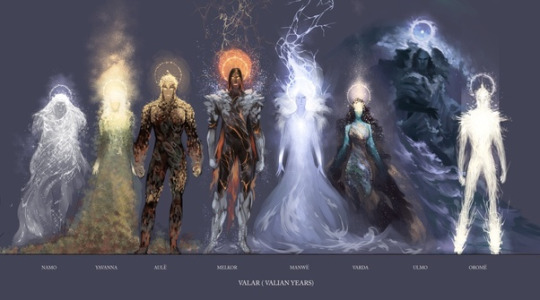
Valar by @phobso
As I usually do with pantheons of gods, allow me to introduce you to the pantheon of Arda! These are the Kings and Queens of the Valar, and there are seven of each:·
Manwë: The god of the sky and wind. He’s the High King of the Gods, just like Zeus. He has the epithet Súlimo, “breather.” Manwë sort of replaced Melkor as the Ainur who best understands Ilúvatar (making him roughly equivalent to the Archangel Michael, if Melkor is Satan).
Varda: The goddess of stars and light, Manwe’s wife. She lives with him in a tower on top of the tallest mountain (Taniquetil), and Being with each other improves their perception, so that they can see and hear everything. Varda hated Melkor before everyone else hated Melkor, and thought he was an asshole even before the Music was sung. The Elves call her Elbereth, and she’s their most important goddess.
Ulmo: The god of water, all water. He spends most of his time in the depths of the ocean, so he doesn’t see the rest of the Valar much and doesn’t bother to take on a human form most of the time. When he does, it is terrifying to see his gigantic form rise out of the waves and hear his voice, which is as deep as the ocean. Despite having disengaged from the other gods, he still loves the Elves and Men. He keeps tabs on them through all the freshwater rivers, lakes, springs, and fountains. Sometimes he wanders on shore in disguise and plays horns made of white shells, which fill whoever hears them with a longing for the sea (like Legolas).
Aulë: The god of rock and metal, precious stones, mountains, smithing, craftsmanship, and terrain. Aulë is the most similar to Melkor in temperament, because both wanted to make things of their own and have others praise them for it. It was mostly Aulë’s job to fix whatever Melkor broke during the creation of Arda, so he hates Melkor as much as anyone else. Melkor, meanwhile, lost his ability to create anything of his own — he can only corrupt or destroy things that others have made, so he especially envies Aulë.
Yavanna: The goddess of nature and agriculture, Aulë’s wife. She usually appears as a woman in a green dress, but sometimes she appears as a Tree of Life who connects the groundwater with the sky. She has the epithet Kementári, “queen of the earth.”
The Fëanturi: The masters of spirits, two brothers who rule over Death and Sleep. They’re called Mandos and Lorién, but these aren’t their actual names—they’re the names of the places they live. Their actual names are Námo and Irmo. (I’m not really sure why they were introduced to us by the names of their domains, but linguistics is weird, and Tolkien fully replicated its weirdness.)
Namó/Mandos: The god of the dead, who lives in the Halls of Mandos, in the far west of Valinor He forgets nothing, knows everything, and knows the fates of everyone. It’s his job to pass judgement upon the beings that live in Arda after they die (or… whatever the elves have instead of death? A sort of purgatory), and he works under Manwë’s authority.
Irmo/Lórien: is the god of dreams, who lives in the gardens of Lórien (now you know where the name “Lothlórien” comes from). The Valar often take breaks in the heavenly world of Lórien whenever Arda becomes too much from them.
Vairë: “The Weaver,” the goddess of history, who records all of time in her webs. She’s Namó’s wife, and lives in Mandos with him.
Estë: The goddess of sleep and healing. Like her husband, she is gentle, refreshing, and not at all like Morpheus.
Nienna: The goddess of sorrow and grief. She mourns incessantly for everything Melkor has ever done, and everything that was hurt or lost as a result. On the slightly brighter side, she’s also the goddess of compassion and hope. She lives even further west than Mandos, and the spirits trapped in Mandos supplicate her for her wisdom. She is Namó and Irmo’s sister.
Tulkas: The god of strength and heroism, who came to Arda specifically to help the other Valar fight Melkor. His epithet is Astaldo, “the valiant.” He has long golden hair and a golden beard, doesn’t need a horse because he can outrun everything, and mostly just punches stuff.
Nessa: The goddess of speed, Tulkas’ wife. She likes running and dancing, and deer follow her everywhere she goes.
Oromë: The god of the hunt and Nessa’s brother. He prefers to stalk around Middle-earth, hunting Melkor’s minions, rather than to live in Valinor with the other Valar. His horse’s name is Nahar. He has the epithet Aldaron or Tauron, “Lord of Forests.” He has a magic hunter’s horn that sounds like the sun rising or like lightning.
Vána: The goddess of youth and flowers, Yavanna’s younger sister and Oromë’s wife.
The influence from the Olympians is obvious, but this little section hints at a lot more depth and complexity in each of these beings (well, the male ones, and about half of the female ones). I’m really interested to see how they develop from here.
In addition to the Valar, there are spirits called the Maiar, which are “of the same order as the Valar but of less degree.” I suppose that means that they’re also Ainur? It’s hard to tell, but regardless, they’re the direct underlings of the Valar and they act as intermediaries, so, we could call them lower-ranking angels. There isn’t any specified number of Maiar, and most of them don’t have names. A handful of them do:
Ilmarë: Varda’s lady-in-waiting.
Eonwë: The herald of Manwë.
Ossë: One of Ulmo’s underlings, the spirit of stormy and choppy seas, who lives near the coasts of the ocean.
Uinen: Ossë’s wife, the spirit of calm seas, who protects marine life. Sailors pray to her to calm the waves, and her hair spreads throughout all the waters. Numenoreans in particular worshipped her. Ossë very nearly joined Melkor, but Uinen prevented this.
Melian: A handmaiden of both Vána and Estë, who lives in Lórien and tends the trees there. She’ll be important in Quenta Silmarillion.
Olorin: Another Maia who lives in Lórien, but he spent a lot of time with Nienna, who taught him compassion and patience. This made him the wisest of the Maiar. He’s not important to this story, but he is important to another story that you already know…
Then of course, there’s Melkor. His name means “who arises in might,” but because he’s evil, he doesn’t deserve to have this name. Instead, the Elves called him Morgoth, which sounds a lot scarier. Because he has some of the powers of all the other Ainur, he can affect all of their creations, but because he’s evil, he can’t do anything with them other than distort and corrupt them. Because he’s arrogant, spiteful, and fixated on ruling the world, this is all he ever does.
Melkor also has Maiar servants among his followers, whom he turned evil; they became fiery demons that the elves call “Valaraukar,” but that we know better as Balrogs. Most of Morgoth’s Maiar don’t have names either, but one of them does. His name is Mairon, which means “admirable,” “excellent,” or “precious.” He was originally one of Aulë’s Maiar, but left his service to join Morgoth, becoming only slightly less evil than Morgoth himself. The Elves decided that he also didn’t deserve his name, and called him Gorthaur the Cruel, or else a name that means (roughly) “abhorred” or “vile” — Sauron.
More to come!
#the silmarillion#silmarillion#tolkien#jrr tolkien#the lord of the rings#lotr#eru iluvatar#melkor#music of the ainur#ainulindale#valaquenta#valar#summary#silm#the silm#silm art#silm fanart
152 notes
·
View notes
Text
Agreed on all counts. Even looking back on early chapters of the work I'm currently working on makes me cringe enough that I'm itching to do a full edit of it.
The most unrealistic part of the Silmarillion is the part where Feanor, master craftsman and creative person(tm), finishes a project and is 100% happy with it and thinks it's perfect.
#silmarillion memes#silmarillion thoughts#silmarllion#feanor#i've never finished a project and been happy with it#imagine everyone talking about how great the silmarils are but you're actually super embarrassed of it because its an old project
1K notes
·
View notes
Note
I want to say how much I love your plushies! They look so soft and cute!! I make my own Silmarllion plushies (I have Sauron, Celebrimbor, Maeglin, and my Nazgul oc) and it's nice to have someone else who does the same!
Thank you so much!! I really appreciate it!! It's awesome that someone else makes Silmarillion plushies! I looked through your blog and could find any pictures, I would love to see them if you have any!
Maeglin is the doll I'm working on right now! He should be done soon!
7 notes
·
View notes
Text

Opening of pre-orders for my wooden standees ! [One piece, Silmarillion & KnB}
They will be double sided (~110mm x 97mm)
Pre-orders close on February 21.
I'm aiming to ship all orders by the end of March.
Early bird surprise : Get 10 % off by using the code EARLYBIRD at checkout (only available during the first 24hours of the pre-orders)
Link to my shop






Reblog to help a small artist <3
#silmarllion#finrod felagund#maglor#one piece#monkey d luffy#trafalgar d water law#knb#akashi seijuro#nijimura shuzo#momoi satsuki#aida riko#kuroko tetsuya#kagami taiga#midorima shintaro#takao kazunari#mayuzumi chihiro#kise ryota#kasamatsu yukio#aomine daiki#murasakibara atsushi#himuro tatsuya
86 notes
·
View notes
Text
Feanor: don’t worry sons, swear this oath and I promise as a family we will succeed, never fear I will be here
Feanor as soon as he arrives in beleriand: *dies*
24 notes
·
View notes
Text
Turgon is the token straight kid in that family.
Of Arakáno and his Ammë.
Argón : Ammë, are you homophobic?
Anairë : Number one, you're gay.
Anairë : Number two, I have a lesbian daughter.
Anairë : Number three, I wacth Rapaul's drag race.
Anairë : How can I be homophonic, idiot?
12 notes
·
View notes
Text

Ulmo is, in short, a complicated character. He is one of Tolkien's earliest characters, first appearing in the 1910s Book of Lost Tales. Like many of Tolkien's early Ainur, he is a tangle of contradictions: the only Vala to remain active in the lives of the people of Middle-earth after the Noldorin exile, yet delighting in scaring those upon whom he visited his blessings. He is both benevolent and terrifying (and, in some of the earliest drafts, a bit silly as well).
This month, @anerea-lantiria tackles the first of a two-part biography of Ulmo, Lord of Waters, focusing on his realm and his relationships with the other Ainur (which, as his complex nature suggests, were also complicated). She also dives—pardon the pun—into some of the mythological correspondences between Ulmo and other sea deities, his special significance as a god of water in a legendarium where water places a central role, and biographical connections that possibly reveal how water—and Ulmo—came to be so central in Tolkien's imagination.
You can read Part 1 of Anérea's biography of Ulmo here.
21 notes
·
View notes
Text
The Ambarussa twin headcanons
Amrod has the most logic and book knowledge
Is basically walking google
And has no people skills at all
Tends to accidentally insult people
Prefers hunting to being in cities that are filled with people
Always has a book in his packs whenever he goes on a hunting trip
Amras has some people skills
Has to translate what the walking google (aka his twin) really means to people
Still doesn’t have the best social skills
prefers the woods but doesn’t mind people as much as his twin
Doesn’t like hunting as much as his twin but still is the better shot
@tolkienfamilyweek Day two: Siblings
41 notes
·
View notes
Text
Context for non-dweebs: Unlike Tolkien's other well known works, The Silmarillion was published posthumously; Tolkien died in 1973, and The Silmarillion first saw print in 1977.
Though Tolkien had shown drafts of The Silmarillion to publishers during his lifetime, there are substantial differences between those drafts and the book that was actually published. It's been a matter of great interest – read: nerd drama – in the Tolkien fandom exactly how much of the published Silmarillion is really the work of J R R Tolkien, and how much of it is original authorship by his son Christopher.
The Tolkien estate has historically maintained that The Silmarllion is all J R R Tolkien, and that Christopher merely acted as an editor, because "by J R R Tolkien (edited by Christopher Tolkien)" is going to sell better than "by Christopher Tolkien (based on the work of J R R Tolkien)".
If The Silmarillion really is 100% J R R Tolkien's work, and Christopher Tolkien was merely an editor, then – since J R R Tolkien died in 1973 – the whole thing will enter the public domain on January 1st, 2044 in all life-plus-70 jurisdictions (i.e., most of the big ones, including the US).
If, however, any major part of the published Silmarillion constitutes original authorship by Christopher Tolkien, then the term of copyright would instead be calculated based on his date of death in 2020, pushing its earliest possible entry into the public domain in life-plus-70 jurisdictions back to January 1st, 2091.
Thus, there exists the possibility that the Tolkien estate might be able to preserve their ownership of The Silmarillion by arguing that they've been lying the whole time about Christopher Tolkien not contributing any original authorship to the published work.
Would it work? Probably not – but it'd be fun to see them try!
I need to live another twenty years purely to see what kind of bullshit the Tolkien estate gets up to with respect to The Silmarillion in 2044.
#media#literature#j r r tolkien#the silmarillion#copyright#intellectual property#death mention#public domain#swearing
12K notes
·
View notes
Text





Annatar #3
#annatar#sauron#maia#silmarllion#lotr#the lord of the rings#tolkien#FFXIV#final fantasy XIV#fallenraziel gameplay
10 notes
·
View notes